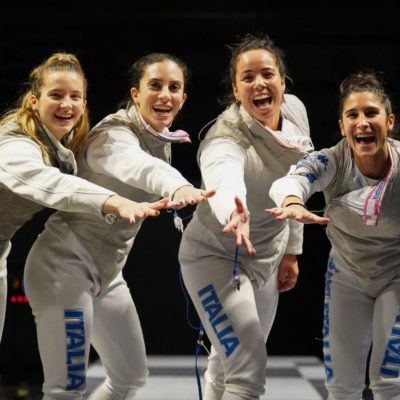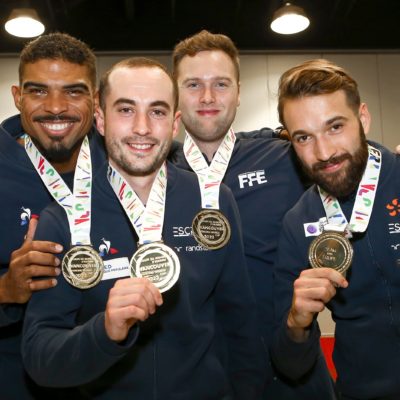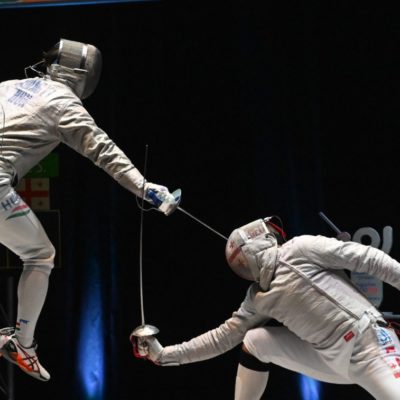Every sport has its superheros, and fencing is no exception. One fencing hero is usually placed among the greatest fencers in the last 100 years: Romankov.
Alexander Anatolievich Romankov is almost as famous for his long competitive career as he is for his results. When older fencers ask themselves if they can still be relevant to International fencing in their thirties, forties and fifties, Romankov’s name invariably floats to the top with a resounding Yes!
{mosimage}Born July 11th, 1953 in the city of Korsakov, Belarussia, Romankov medaled for the Soviet Union at five World Championships and three Olympics. He won his final Olympic Bronze in 1988, at 35 years old — an “old man” in Olympic terms. He presently holds the highest American rating possible, and as recently as August 2002, age 49, he placed at the A-level Romankov/Koretski Camp Tournament. (View tournament results.) Few Olympic sports can claim such relevant competitors in this age group.
There’s a simple reason for Romankov’s long competitive career — and for why the sport of fencing rewards age in general. Fencing is a combat sport, and in combat, wit is as important as energy.Every erg of athletic energy is matched by an equal expenditure of brainpower.
In fencing, the combat interface is very direct — blade-to-blade. When you cross blades with an opponent whose only goal is to send you home, you feel every twitch of muscle through the steel. Fencers have a name for this, sentiment du fer, or “sense of iron.”
Romankov is a master of sending the wrong signals down the blade. Using body language and fearsomely perfect hand-technique, Romankov exploits his nervous opponents’ twitch factor, “opening them up” on-target hits. Reading Romankov’s movements is like witnessing a mime on a killer rampage: There is too much kinetic information to process all at once, and too much misinformation to trust any of it.
 |
|
Beatable? Yes!
American fencer (and eight-time National Champion) Michael Marx once beat Romankov by the simple expedient of ignoring every common-sense rule about fencing. Stopping short of closing his eyes, Marx stepped in when he should have stepped back, attacked when he should have defended. On that day, the only way to beat Romankov’s game was to throw the game out the window.
Miscommunication is only one of Romankov’s weapons. His sense of distance, his footwork and fencing hand caused a whole generation of fencers to “go Russian” and adopt Russian techniques. Romankov is able to meet the trickiest attacks with solid blocks — his hand seems omniscient. He then lances forward with small tip movements that easily evade his opponent’s attempts to defend. Romankov makes landing a tip upon the opponent’s target — never easy even against beginners — seem like child’s play. At times, it seemed like he was giving his world-class competitors fencing lessons.
In the final analysis, Romankov dominated the fencing world with technique, honed in his youth through unending daily practices with his coach father. His finesse imparts a calm precision that allows his every fantastic improvisation to succeed.
Romankov clocked up an amazing record — ten times World Champion, five individual (1974, 1977, 1979, 1982 and 1983) and five team. He won an Olympic Gold Medal, two Silver and two Bronze for individual and team (1976, 1980 and 1988). He has won repeated Soviet National Championships, and even has a rare fencing degree — Honored Master of Sports, BSIPC (1977). In his waning days as a competitor, Romankov helped train up the other generation-defining Eastern Bloc fencer — a young Ukrainian named Sergei Golubitsky.
{mosimage}Today, Romankov is a highly-sought fencing coach who competes for pleasure. In 2000, he was employed by the Australian Fencing Federation to improve the Australian team before the Sydney Olympics. He gives numerous workshops and training camps, in America and abroad.
In 2000, the FIE (World Fencing Federation) published a report of the Seoul, South Korea World Championships. Published twelve years after Romankov’s last notable result, fencing notable Jean-Marie Safra called him “The Tsar of fencing.”
 |
|





